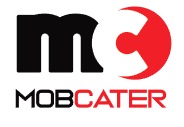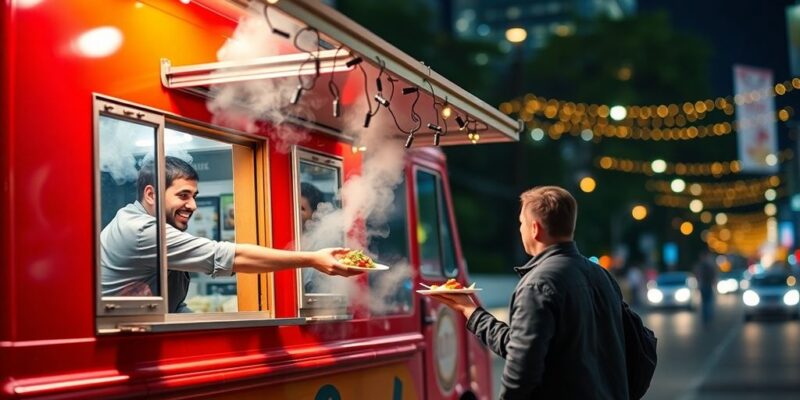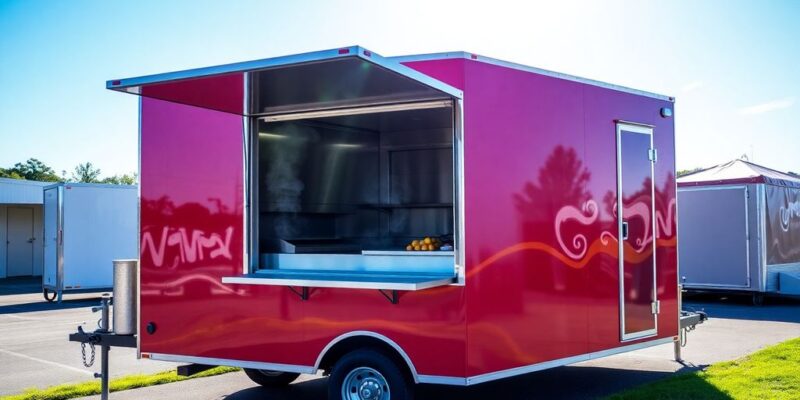Mobile Catering UK: Legal Requirements & Regulations Explained”

Are you really thinking about starting your own mobile catering business here in the UK? It’s a great opportunity and an exciting idea, with loads of chances to sell your delicious food. But before you get stuck in, there are a few important things to sort out. It’s not just about cooking up a storm; you’ve got to get your head around all the rules, costs, and how to actually get customers. This guide will walk you through the ins and outs of setting up your mobile catering legal requirements UK. We’ll cover everything from getting your paperwork in order to making sure your food is safe and tasty, and even how to tell people about your awesome new venture. Let’s get cracking!
Key Takeaways
- You’ll need a mobile catering licence from your local council, and you’ll have to renew it every year.
- Your mobile kitchen will need an inspection from the environmental health team to get a food hygiene rating.
- You have to follow rules for gas, electrics, and fire safety to keep everyone safe.
- There are specific rules about how to get rid of your waste and what you need to recycle.
- It’s a good idea to have public liability insurance, and if you have staff, employer’s liability insurance is a must.
Essential Business Registration for Mobile Catering UK
So, you’re thinking of hitting the road with your own mobile catering business? Awesome! But before you start dreaming of gourmet burgers and bustling festivals, there’s some paperwork to sort. Getting your business registered properly is the first step to making sure you’re operating legally and avoiding any nasty surprises down the line. It might seem a bit dull, but trust me, it’s way better to get this sorted early on. Let’s break down the essentials.
Registering Your Food Business with the Local Authority
Right, first things first: you need to register your food business with your local council. Think of it as introducing yourself and letting them know you’re serious about food safety. You have to do this at least 28 days before you start trading, and the good news is, it’s free! They’ll want to know where your business is based (or where your van lives overnight), what kind of food you’ll be serving, and how you plan to operate. Once you’re registered, expect a visit from the Environmental Health Department within the first three months to check you’re up to scratch. It’s all about making sure you meet those all-important food safety regulations. If you have more than one mobile catering unit, make sure you register them all. You can contact us for more information about the process.
Obtaining Necessary Trading Licences
Now, depending on where you plan to set up shop, you might need a street trading licence. If you’re planning on parking up on a public street or roadside, you’ll almost certainly need one. However, if you’re on private land or at an event, you might be okay without one – provided the event organiser has already sorted out their own licence. It’s always best to check with the local council to be absolutely sure. Nobody wants to get shut down mid-service! Also, you need to get the right legal structure for you and your business. You need to get your paperwork set up in order to operate legally as a business and there are different options available depending on your situation and circumstances. You can register as a limited company or a sole trader/ partnership. The latter is the simpler option and is more suitable for small operations made up of just you or a few additional people.
Choosing the Right Legal Structure
Deciding on your business’s legal structure is a biggie. Are you going solo as a sole trader, or teaming up in a partnership? Maybe you’re thinking of setting up a limited company? Each option has its own pros and cons when it comes to things like tax, liability, and how much paperwork you’ll be dealing with. As a sole trader, you own the business and effectively are the business. You are classed as self-employed. Your profits are subject to income tax and National Insurance (Class 2 and 4). If the business fails, you are personally liable for all of its debts. As a limited company, you are a director and shareholder of the company. You are an office holder and an employee of the company. Your profits are subject to corporation tax (a lower rate than income tax). If the company fails, you will not be held personally responsible for debts, under normal circumstances. It’s worth doing your homework or chatting with an accountant to figure out what’s best for your situation. Getting this right from the start can save you a lot of headaches later on. You can even look into equipment leasing to help with initial costs.
Ensuring Food Safety Compliance in Mobile Catering
Running a mobile catering business means you’re responsible for keeping your customers safe. Food safety and hygiene are absolutely key. It’s not just about avoiding fines; it’s about protecting people and building a good reputation. Let’s look at what you need to do.
Implementing a Food Safety Management System
A Hazard Analysis and Critical Control Point (HACCP) system is pretty much a must. It helps you spot potential food safety risks in your operation – from storage to cooking – and put measures in place to control them. Think of it as your food safety blueprint. Keeping records of your HACCP actions is also a good idea. It’s a way to show you’re taking food safety seriously. You can identify potential risks and implement measures to ensure these risks are reduced or removed. Keeping records of the actions you have taken in line with HACCP is recommended.
Here’s a quick rundown of what a HACCP plan usually involves:
- Identifying potential hazards (biological, chemical, physical).
- Determining critical control points (CCPs) where hazards can be prevented or reduced.
- Establishing critical limits for each CCP.
- Setting up monitoring procedures.
- Establishing corrective actions if a CCP is not under control.
- Verifying the system is working effectively.
- Keeping records to show the system is in place and working.
It’s really important to get this right from the start. Don’t just assume you can sort it out later. Take the time to research your options, talk to an accountant or business advisor, and make sure you’re setting up your business in a way that protects you and complies with the law.
Conducting Regular Risk Assessments
In addition to having a food management system, you must also regularly carry out and document risk assessments relating to food safety, fire safety and health and safety. Whenever you change your processes, such as by adding a new item to the menu, you should carry out a new risk assessment. These assessments should be thorough and cover all aspects of your operation. Think about things like:
- Food preparation methods
- Storage of ingredients
- Cooking temperatures
- Potential for cross-contamination
Make sure to document everything! It’s no good doing a risk assessment if you don’t write it down. Keep your risk assessments up-to-date and review them regularly. This is especially important if you change anything about your menu or your processes. You can find a wide range of mobile catering appliances to help you maintain food safety standards.
Mandatory Food Hygiene Training
Every staff member working in a catering business must receive training relevant to the job they do. Every caterer wants a Level 5 Food Hygiene Rating and to get one there are a few things you can do. Firstly, find out what to expect when an Environmental Health Officer visits, use effective inspection checklists to prepare for your next inspection so you are prepared to answer any questions they may have. General Members of staff should get at least a level one and ideally there should be someone on site with a minimum level of 3. There are plenty of courses so you can shop around for prices. They are generally online or at conference centres and its a multiple choice tests.
Here’s a breakdown of the typical levels:
- Level 1: Basic food hygiene awareness (suitable for those handling low-risk foods).
- Level 2: Food hygiene certificate (essential for all food handlers).
- Level 3: Supervising food safety (for supervisors and managers).
Critical Safety Certifications for Mobile Catering UK
Running a mobile catering business means you’re responsible for keeping everyone safe – your staff, your customers, and yourself. It’s not just about serving tasty food; it’s about doing it safely. That’s where safety certifications come in. They’re not just bits of paper; they’re proof that you’re taking safety seriously. Let’s break down the key ones you’ll need.
Securing Gas Safety Certificates
If you’re using LPG (Liquid Petroleum Gas) equipment, a Gas Safety Certificate is an absolute must. Think of it like an MOT for your gas appliances. You need a Gas Safe registered engineer, qualified in mobile catering and LPG, to inspect your setup annually. They’ll check everything’s installed correctly, working safely, and that there are no leaks. New trailers and equipment should come with certification, but it’s still worth getting it checked independently. Don’t skip this – gas leaks or faulty equipment can be incredibly dangerous.
Obtaining Electrical Safety Certificates
Just like gas, electricity can be a hazard if not handled properly. Under UK law, employers must provide safe premises and equipment. Getting an electrical safety check for your entire installation is a smart move. This should be followed by regular checks – either every 6 or 12 months. A NIC/IEC registered electrician can do these checks, as well as Portable Appliance Testing (PAT). PAT testing focuses on portable appliances, while the electrical safety test covers the fixed wiring. You can even do a short course to PAT test your own equipment, which might save you some money in the long run. Remember, safe equipment is essential for your business.
Maintaining Fire Safety Protocols
Fire safety is something you can’t afford to ignore. Mobile catering environments can be high-risk due to cooking equipment, gas, and electricity all being in close proximity. Here’s what you need to think about:
- Fire extinguishers: Make sure you have the right type of fire extinguishers for the potential hazards in your unit (e.g., a fire extinguisher suitable for grease fires). Everyone on staff needs to know where they are and how to use them.
- Fire blankets: A fire blanket is a good addition, especially for smothering small cooking fires.
- Regular risk assessments: Carry out regular fire risk assessments and document them. This helps you identify potential fire hazards and put measures in place to reduce the risk.
- Clear exits: Ensure exits are clearly marked and easy to access. Don’t block them with equipment or stock.
It’s also a good idea to have a fire safety plan in place, so everyone knows what to do in case of a fire. This should include evacuation procedures and emergency contact numbers. Review this plan regularly with your staff.
Understanding Insurance Requirements for Mobile Caterers
Right, let’s talk insurance. It’s not the most thrilling topic, I know, but trust me, getting your insurance sorted is absolutely vital for any mobile catering business. Think of it as a safety net – you hope you’ll never need it, but you’ll be seriously glad it’s there if something goes wrong. Running a mobile catering business comes with risks, and having the right insurance is super important. It’s not just about ticking boxes; it’s about protecting your livelihood and ensuring you can bounce back if something goes wrong.
Public Liability Insurance Coverage
Public liability insurance is a must-have. Imagine someone tripping over a cable outside your van and hurting themselves – this insurance can help cover the legal and compensation costs. It covers you if a member of the public, like a customer, gets injured or their property is damaged because of your business. It’s peace of mind for those unexpected accidents. It’s there to protect you if a customer has an accident related to your business.
Employer’s Liability Insurance Obligations
If you’re employing anyone, even if it’s just a mate helping out on weekends, you’ll almost certainly need employer’s liability insurance. It’s usually a legal requirement, so don’t skip it! It covers you if an employee gets injured or becomes ill as a result of working for you. For example, if someone slips in the van and breaks their arm, this insurance can cover their medical expenses and any compensation they might be entitled to. It’s about protecting your employees and complying with the law. It’s there to protect you if a member of staff has an accident related to your business.
Product Liability Protection
If you’re serving food, product liability insurance is really important. It protects you if someone gets ill or injured from something they’ve eaten from your catering unit. Think about it: if a customer gets food poisoning, they might make a claim against you. This insurance helps cover those costs, including legal fees and compensation. It’s about safeguarding your business from potential health-related claims.
Getting the right insurance might seem like a hassle, but it’s a vital part of running a mobile catering business. It’s about protecting yourself from financial losses due to accidents, injuries, or other unforeseen events. Take the time to research your options and find the policies that best suit your needs. It’s an investment in your business’s future.
Operational Guidelines for Mobile Catering Success

So, you’ve got the legal stuff sorted, the food safety nailed, and the right insurance in place. Now, let’s talk about actually running your mobile catering business like a pro. It’s not just about turning up and serving food; it’s about making smart choices that will keep customers happy and your business thriving.
Strategic Location Selection and Permissions
Choosing the right spot is half the battle. You could have the best burgers in the world, but if you’re parked in the middle of nowhere, nobody’s going to know. Think about where your target customers are likely to be. Are there any local markets, festivals, or events that would be a good fit? What about industrial estates during lunchtime?
Before you set up shop anywhere, you must get permission. This usually means contacting the landowner or the local council. Don’t just assume you can pitch up wherever you fancy; you could end up with a hefty fine or even have your equipment confiscated. Securing the right permissions is key.
Effective Waste Management and Recycling
Nobody wants to eat next to overflowing bins. Proper waste management is essential for keeping your site clean, tidy, and compliant with environmental regulations.
Here’s a few things to consider:
- Use bins with secure lids to prevent spills and keep pests away.
- Separate your waste into different categories for recycling (food waste, cardboard, plastic, etc.).
- Find a reliable waste disposal service that can collect your rubbish regularly.
It’s worth remembering that customers are increasingly conscious of environmental issues. Showing that you’re committed to reducing waste and recycling can be a great way to attract business and build a positive reputation.
Maintaining Hand Washing Facilities
Clean hands are happy hands (and happy customers!). Providing adequate hand washing facilities is not just good hygiene practise; it’s a legal requirement. You need to have a dedicated hand washing station that’s easily accessible to both staff and customers.
At a minimum, your hand washing station should include:
- Hot and cold running water
- Soap (preferably antibacterial)
- Paper towels or a hand dryer
Make sure your staff know how to use the hand washing facilities properly, and encourage them to wash their hands frequently, especially after handling food or money. Consider investing in a mobile hand wash station for convenience.
Financial and Record-Keeping Responsibilities
Running a mobile catering business isn’t just about serving up delicious food; it’s also about keeping your finances in order and staying on the right side of the taxman. It might seem daunting, but with a bit of organisation, it’s totally manageable. Let’s break down the key financial responsibilities you’ll face.
Notifying HMRC of Self-Employment
So, you’ve decided to be your own boss? Ace! The first thing you need to do is let HMRC (Her Majesty’s Revenue and Customs) know that you’re self-employed. This is super important because it kicks off your tax obligations. You’ll need to register as self-employed, usually online, and get yourself set up for paying income tax and National Insurance contributions through Self Assessment. Don’t leave it too late; there are deadlines to meet, and nobody wants a fine from HMRC!
VAT Registration Threshold Compliance
VAT, or Value Added Tax, is a tax you might need to charge on your sales. Whether you need to register for VAT depends on your turnover (how much money your business makes in a year). There’s a threshold, and if you think your turnover will go over that in the next 30 days, or has already gone over it in the past 12 months, you’ll need to register. Keep a close eye on your sales figures. If you’re providing catering equipment, you’ll need to factor that into your calculations too.
Accurate Financial Record Keeping
This is where things get real. Keeping accurate financial records is absolutely vital. Think of it as your business’s financial diary. You need to keep track of every penny coming in and every penny going out. This includes:
- Sales invoices
- Purchase receipts
- Bank statements
- Expense claims
Why bother? Well, for starters, it makes doing your tax return a whole lot easier. Plus, it gives you a clear picture of how your business is performing. Are you making a profit? Are your expenses too high? Good records help you answer these questions and make smart decisions. You’ll also need these records in case HMRC ever comes knocking. They can ask to see your records to check you’re paying the right amount of tax. Keep your records safe and sound, ideally both physically and digitally. Most people keep records for at least six years, just to be on the safe side. Keeping on top of your finances might seem like a chore, but it’s an investment in your business’s future. Good financial management can help you grow, avoid penalties, and sleep soundly at night knowing you’re doing everything by the book.
Conclusion
Right, so starting a mobile catering business in the UK, it’s a big deal, isn’t it? But honestly, it’s totally possible if you just get everything sorted from the start. You’ve really got to make sure you’re legal, with all the right licences from your local council, and don’t forget about those food safety checks. Things like making sure your gas is safe, your electrics are okay, and you’ve got fire safety covered are super important too. And, obviously, dealing with your rubbish properly and having the right insurance is a must-do. It might feel like a lot to get your head around, but doing your homework early on means you’ll be ready to go and can avoid any problems later. Just take it step by step, and you’ll be dishing out delicious food before you know it!
Frequently Asked Questions
Do I really need to register my mobile catering business with the local council?
Absolutely! Before you even think about serving your first customer, you must tell your local council about your food business. You need to do this at least 28 days before you start. It’s free and it’s super important for making sure your food is safe for everyone. The council will want to know where you’ll be based and what kind of tasty treats you’ll be selling.
Is a Gas Safety Certificate a must-have for mobile caterers?
Yes, definitely! If you’re going to use gas equipment, you need a Gas Safety Certificate. This certificate shows that your gas setup has been checked by a qualified engineer and is safe to use. It’s usually needed once a year to keep everything above board and prevent accidents.
What types of insurance are important for a mobile catering business?
It’s a good idea to have public liability insurance. This type of insurance helps protect you if a customer gets hurt or their property gets damaged because of your business. If you plan to hire people, then Employer’s Liability Insurance is a legal requirement. This covers you if one of your staff gets injured while working for you.
What do I need to do to make sure my food is safe?
You need to have a plan for how you’ll keep food safe, often called a Food Safety Management System. This means you’ll have rules for things like keeping food at the right temperature, preventing cross-contamination, and making sure your kitchen is clean. You’ll also need to do regular checks to spot any risks and make sure your staff know all about food hygiene.
How do I pick the best spot for my mobile catering unit?
Choosing where to set up your mobile catering unit is a big deal! You’ll need to think about where your customers are and if you need special permission to trade there. For example, if you want to sell food on a public street, you’ll probably need a street trading licence from the council. If you’re on private land, like at a festival, the event organiser usually handles the main permissions.
What are the main financial things I need to take care of?
You need to tell HMRC (Her Majesty’s Revenue and Customs) that you’re self-employed. This means you’ll be responsible for sorting out your own taxes. You also need to keep good records of all the money your business takes in and spends. This helps you fill out your tax return correctly each year.



